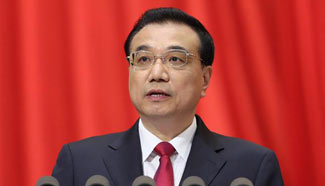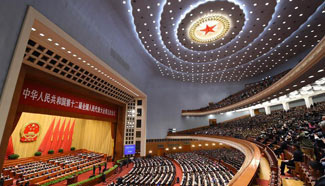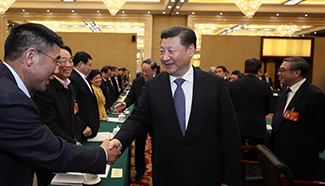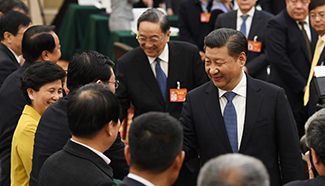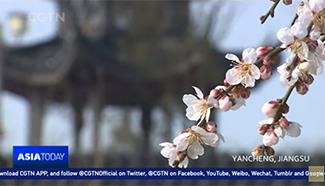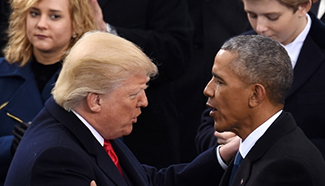BEIJING, March 5 (Xinhua) -- Despite holding two master's degrees, one from Johns Hopkins University and one from Stanford University, Xu Qingyuan returned from America to work in China.
She returned after earning her second master's degree, on U.S.-China economic relations, from Stanford University in 2013, and entered China's State Information Center to provide policy analysis on the United States, the European Union and Australia.
Having decided to pursue a career in the think tank industry during her first master's degree study, Xu finally chose to work for the Beijing-based government think tank. She believes talent like herself is much more needed at home.
"My specialty can contribute a lot to China's flourishing think tank industry and, eventually, overall development," Xu said.
Xu is not the only case of Chinese talent returning from overseas. Having developed rapidly for years, China is more and more attractive to overseas talent as a place to achieve their dreams. People like Xu are also needed to power of the country's development.
In 2016, 544,500 Chinese students studied overseas, 144,900 people more than 2012; while the number of returnees in 2016 was 432,500, up 159,600 on 2012, according to the Ministry of Education Wednesday. Returnees are on the rise.
Recently, both Nobel laureate Chen Ning Yang and Turing Award-winning computer scientist Andrew Chi-Chih Yao gave up their foreign citizenship and become Chinese citizens again, raising widespread attention in China.
With about 58 percent more people returning to China last year than in 2012, going back home is an increasingly popular choice.
For astrophysicist Zhang Shuangnan, who returned to China in 2002, going back home was about pursuing his long-held dream.
In 2001, having studied and worked in the United Kingdom and the United States for over 10 years, Zhang was invited back to China to work on a project developing the Hard X-ray Modulation Telescope (HXMT), a specialized space telescope that can observe black holes, neutron stars and other phenomena based X-ray and gamma ray emissions.
Having worked for NASA and Alabama University, Zhang had always wished to do this, despite the fact that leading core space projects such as HXMT without American citizenship was hardly possible in the United States.
"I realized the hope had come to me," Zhang said. It did not take long for him to make the decision - leaving his position as a tenure-tracked faculty member in Alabama University to come back for the project in Beijing.
As a result of the hard work by Zhang and his team, the HXMT is now ready for launch in the middle of 2017. They also developed an instrument called "POLAR," which was set atop China's first space lab Tiangong-2 that was launched in September 2016 and has been working successfully since then.
"I could hardly finish any of these works in the United States," said Zhang, currently the director of the Key Laboratory of Particle Astrophysics at the High Energy Physics Institute of the Chinese Academy of Sciences (CAS).
Reaching out for ideals that are hard to be realize abroad was also part of the reason that Ding Hong returned.
Ding was invited by the Institute of Physics under CAS in 2008, when he had lived in the United States for 18 years and was a tenured professor at Boston College.
After paying several visits to the institute, the physicist found the research environment satisfying and saw it as an ideal place to work on improving large-scale scientific facilities in China.
"I hope to improve the general research level by introducing more advanced facilities," Ding said. He had put much of his efforts working into large-scale scientific facilities programs, which were significant for scientific research development but were long lacking in China.
As for Ding, implementation of such a plan was easier in his home country than abroad, since a mutual cultural background made communication so much smoother.
"As a result, ideas become actions more easily in China," Ding said.
Experience overseas also helps experts contribute to the fields they are working in, making returning to China a win-win scenario.
Having spent 10 years researching and teaching in the United States, Ding said that such experience gave him much to contribute to his field in China, in that he can share good experiences with other researchers in China and also introduce more international cooperation with his network overseas.
"While many fields have passed their peak abroad, they are still rapidly developing in China, which means there's great demand for high-quality Chinese talent," Zhang said.
While Zhang recalls that when he went abroad for study, the ultimate goal for most Chinese students was to stay abroad, many of his students choose to return nowadays.
As huge changes have taken place in social economy over the past several decades, there are more opportunities to explore for the future, and people are considering more about their own ideals, rather than just about getting by, and that includes Xu.
"Nothing is more meaningful than fulfilling my value to my home country." she said.

